Connect With Us
Blog
Items filtered by date: October 2024
Potential Foot and Ankle Injuries During Workouts
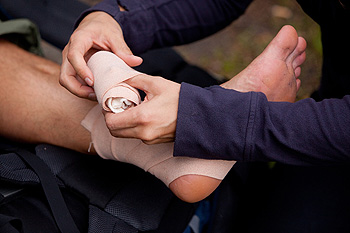
Foot and ankle injuries are common during workouts, especially in high-impact activities like running, jumping, and weightlifting. Common injuries include sprains, strains, stress fractures, and Achilles tendonitis. These occur due to improper form, overuse, or inadequate footwear. Ankle sprains, for example, happen when the ligaments are stretched beyond their limit, while stress fractures develop from repetitive stress on bones. Treatment depends on the severity of the injury. Minor injuries can be managed with rest. Severe cases may require immobilization or targeted stretching exercises. Preventing these injuries involves warming up properly, wearing supportive shoes, and focusing on strength and balance training. Strengthening foot and ankle muscles and using proper form during exercises can reduce injury risks. Listen to your body and avoid pushing through pain to stay safe during workouts. If you have sustained a foot or ankle injury during your workout, it is suggested that you schedule an appointment with a podiatrist for a proper diagnosis and treatment.
Sports related foot and ankle injuries require proper treatment before players can go back to their regular routines. For more information, contact one of our podiatrists of Bergen Foot & Ankle. Our doctors can provide the care you need to keep you pain-free and on your feet.
Sports Related Foot and Ankle Injuries
Foot and ankle injuries are a common occurrence when it comes to athletes of any sport. While many athletes dismiss the initial aches and pains, the truth is that ignoring potential foot and ankle injuries can lead to serious problems. As athletes continue to place pressure and strain the area further, a mild injury can turn into something as serious as a rupture and may lead to a permanent disability. There are many factors that contribute to sports related foot and ankle injuries, which include failure to warm up properly, not providing support or wearing bad footwear. Common injuries and conditions athletes face, including:
- Plantar Fasciitis
- Plantar Fasciosis
- Achilles Tendinitis
- Achilles Tendon Rupture
- Ankle Sprains
Sports related injuries are commonly treated using the RICE method. This includes rest, applying ice to the injured area, compression and elevating the ankle. More serious sprains and injuries may require surgery, which could include arthroscopic and reconstructive surgery. Rehabilitation and therapy may also be required in order to get any recovering athlete to become fully functional again. Any unusual aches and pains an athlete sustains must be evaluated by a licensed, reputable medical professional.
If you have any questions please feel free to contact our offices located in Fort Lee, NJ and Flushing, NY . We offer the newest diagnostic and treatment technologies for all your foot and ankle needs.
Diagnosis and Treatment of Lateral Ankle Injuries
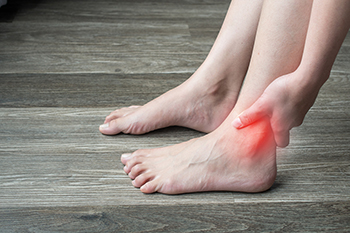
Lateral ankle injuries involve damage to the ligaments on the outer side of the ankle. They are often caused by rolling or twisting the foot during activities like running, jumping, or walking on uneven surfaces. Such ankle injuries are common in athletes but can happen to anyone, especially during sudden movements or improper foot placement. The most frequent type of lateral ankle injury is an ankle sprain, where the ligaments stretch or tear. Symptoms include pain, swelling, bruising, and difficulty bearing weight on the injured foot. Diagnosis typically involves a physical exam and imaging tests, such as X-rays or MRI scans to rule out fractures and assess ligament damage. Treatment depends on the severity of the injury. Severe sprains may require bracing or targeted exercises to restore strength and mobility. If you have pain on the outside of your ankle, it is suggested that you visit a podiatrist for a diagnosis and proper care so as to prevent long-term ankle instability.
Ankle pain can have many different causes and the pain may potentially be serious. If you have ankle pain, consult with one of our podiatrists from Bergen Foot & Ankle. Our doctors will assess your condition and provide you with quality foot and ankle treatment.
Ankle pain is any condition that causes pain in the ankle. Due to the fact that the ankle consists of tendons, muscles, bones, and ligaments, ankle pain can come from a number of different conditions.
Causes
The most common causes of ankle pain include:
- Types of arthritis (rheumatoid, osteoarthritis, and gout)
- Ankle sprains
- Broken ankles
- Achilles tendinitis
- Achilles tendon rupture
- Stress fractures
- Tarsal tunnel syndrome
- Plantar fasciitis
Symptoms
Symptoms of ankle injury vary based upon the condition. Pain may include general pain and discomfort, swelling, aching, redness, bruising, burning or stabbing sensations, and/or loss of sensation.
Diagnosis
Due to the wide variety of potential causes of ankle pain, podiatrists will utilize a number of different methods to properly diagnose ankle pain. This can include asking for personal and family medical histories and of any recent injuries. Further diagnosis may include sensation tests, a physical examination, and potentially x-rays or other imaging tests.
Treatment
Just as the range of causes varies widely, so do treatments. Some more common treatments are rest, ice packs, keeping pressure off the foot, orthotics and braces, medication for inflammation and pain, and surgery.
If you have any questions, please feel free to contact our offices located in Fort Lee, NJ and Flushing, NY . We offer the newest diagnostic and treatment technologies for all your foot care needs.
Achilles Tendon Tears and Treatment
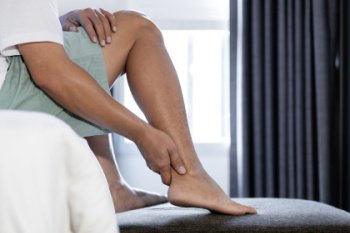
Achilles tendon tears occur when the tendon connecting the calf muscles to the heel bone is overstretched or ruptured, often during activities that involve sudden movements or intense stress, such as jumping or sprinting. Common causes include sports injuries, falls, or sudden increases in physical activity without proper conditioning. Risk factors include aging, tight calf muscles, and certain medications that weaken the tendon. Symptoms of an Achilles tendon tear include a sharp pain in the back of the ankle, swelling, difficulty walking, and an inability to push off the foot or stand on tiptoes. Some may hear a pop sound at the moment of injury. Diagnosis is typically made through physical examination, where a gap in the tendon may be felt, along with imaging tests like ultrasounds or MRI scans. Treatment options range from rest and immobilization in mild cases to surgery for more severe tears. If you have injured your Achilles tendon, it is suggested that you schedule an appointment with a podiatrist for a proper diagnosis and treatment.
Achilles tendon injuries need immediate attention to avoid future complications. If you have any concerns, contact one of our podiatrists of Bergen Foot & Ankle. Our doctors can provide the care you need to keep you pain-free and on your feet.
What Is the Achilles Tendon?
The Achilles tendon is a tendon that connects the lower leg muscles and calf to the heel of the foot. It is the strongest tendon in the human body and is essential for making movement possible. Because this tendon is such an integral part of the body, any injuries to it can create immense difficulties and should immediately be presented to a doctor.
What Are the Symptoms of an Achilles Tendon Injury?
There are various types of injuries that can affect the Achilles tendon. The two most common injuries are Achilles tendinitis and ruptures of the tendon.
Achilles Tendinitis Symptoms
- Inflammation
- Dull to severe pain
- Increased blood flow to the tendon
- Thickening of the tendon
Rupture Symptoms
- Extreme pain and swelling in the foot
- Total immobility
Treatment and Prevention
Achilles tendon injuries are diagnosed by a thorough physical evaluation, which can include an MRI. Treatment involves rest, physical therapy, and in some cases, surgery. However, various preventative measures can be taken to avoid these injuries, such as:
- Thorough stretching of the tendon before and after exercise
- Strengthening exercises like calf raises, squats, leg curls, leg extensions, leg raises, lunges, and leg presses
If you have any questions please feel free to contact our offices located in Fort Lee, NJ and Flushing, NY . We offer the newest diagnostic tools and technology to treat your foot and ankle needs.
How Diabetes Affects the Feet
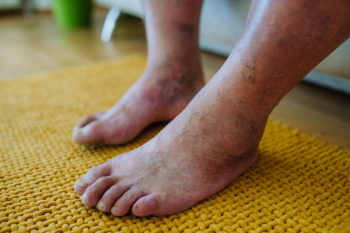
Diabetes can significantly impact foot health, primarily through a condition known as diabetic neuropathy. This occurs when high blood sugar levels damage the nerves in the feet, leading to symptoms like numbness, tingling, and pain. In severe cases, diabetic patients might experience a loss of sensation, making it difficult to detect injuries or infections. Additionally, poor circulation can slow down healing, which increases the risk of ulcers and infections. Proper management of blood sugar levels is key to preventing these complications. Regular foot inspections, wearing proper footwear, and daily foot care can help mitigate the effects. Treatment often involves managing diabetes effectively, controlling pain with medications, and in some cases, foot exercises. To ensure optimal foot health and address any concerns, it is suggested you schedule an appointment with a podiatrist for specialized care and preventive strategies tailored to your needs.
Diabetic foot care is important in preventing foot ailments such as ulcers. If you are suffering from diabetes or have any other concerns about your feet, contact one of our podiatrists from Bergen Foot & Ankle. Our doctors can provide the care you need to keep you pain-free and on your feet.
Diabetic Foot Care
Diabetes affects millions of people every year. The condition can damage blood vessels in many parts of the body, especially the feet. Because of this, taking care of your feet is essential if you have diabetes, and having a podiatrist help monitor your foot health is highly recommended.
The Importance of Caring for Your Feet
- Routinely inspect your feet for bruises or sores.
- Wear socks that fit your feet comfortably.
- Wear comfortable shoes that provide adequate support.
Patients with diabetes should have their doctor monitor their blood levels, as blood sugar levels play such a huge role in diabetic care. Monitoring these levels on a regular basis is highly advised.
It is always best to inform your healthcare professional of any concerns you may have regarding your feet, especially for diabetic patients. Early treatment and routine foot examinations are keys to maintaining proper health, especially because severe complications can arise if proper treatment is not applied.
If you have any questions please feel free to contact our offices located in Fort Lee, NJ and Flushing, NY . We offer the newest diagnostic and treatment technologies for all your foot and ankle needs.
We Can Treat Your Foot or Ankle Pain
Poor Circulation in the Legs and Feet
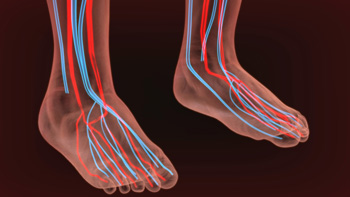
Poor circulation in the legs and feet, often due to peripheral artery disease, or PAD, occurs when narrowed arteries reduce blood flow. Symptoms include coldness, numbness, tingling, cramping, or pain in the legs or feet, particularly while walking. The skin may appear pale or bluish, and slow-healing wounds or sores can develop on the lower extremities. Diagnosis involves a physical exam, checking pulses in the feet, and tests to measure blood pressure differences between the arms and legs. Ultrasound or angiography may also be used to evaluate blood flow. Treatment aims to improve circulation through lifestyle changes like exercise and managing conditions like diabetes and high blood pressure. Medications may be prescribed, and in severe cases, procedures to open or bypass blocked arteries are necessary. If you have symptoms of poor circulation in your feet, it is suggested that you visit a podiatrist who can help manage symptoms and prevent complications like foot ulcers or infections.
Poor circulation is a serious condition and needs immediate medical attention. If you have any concerns with poor circulation in your feet contact one of our podiatrists of Bergen Foot & Ankle. Our doctors will treat your foot and ankle needs.
Poor Circulation in the Feet
Poor blood circulation in the feet and legs is can be caused by peripheral artery disease (PAD), which is the result of a buildup of plaque in the arteries.
Plaque buildup or atherosclerosis results from excess calcium and cholesterol in the bloodstream. This can restrict the amount of blood which can flow through the arteries. Poor blood circulation in the feet and legs are sometimes caused by inflammation in the blood vessels, known as vasculitis.
Causes
Lack of oxygen and oxygen from poor blood circulation restricts muscle growth and development. It can also cause:
- Muscle pain, stiffness, or weakness
- Numbness or cramping in the legs
- Skin discoloration
- Slower nail & hair growth
- Erectile dysfunction
Those who have diabetes or smoke are at greatest risk for poor circulation, as are those who are over 50. If you have poor circulation in the feet and legs it may be caused by PAD and is important to make changes to your lifestyle in order to reduce risk of getting a heart attack or stroke. Exercise and maintaining a healthy lifestyle will dramatically improve conditions.
As always, see a podiatrist as he or she will assist in finding a regimen that suits you. A podiatrist can also prescribe you any needed medication.
If you have any questions please feel free to contact our offices located in Fort Lee, NJ and Flushing, NY . We offer the newest diagnostic and treatment technologies for all your foot and ankle needs.

